After upgrading the system from an older Windows version, say Windows 8 to a new Windows version, say Windows 10 or Windows 11, some users receive the “Windows did not detect any networking hardware” error message. On the other hand, some users received this error message after installing a Windows update. If Windows does not detect networking hardware, you will not be able to connect your system to the internet. Today, most of our work requires an internet connection. Hence, this error makes our system nearly useless. If you encounter this error on your system, the solutions provided in this post may help you fix it.
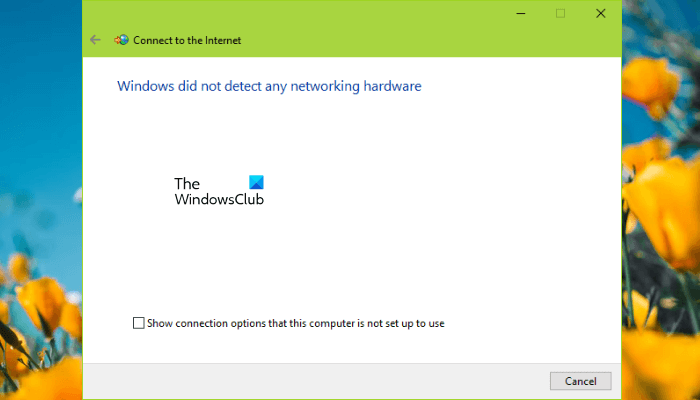
Windows did not detect any networking hardware
Try the following solutions to resolve this issue.
- Run Network Adapter Troubleshooter
- Roll Back your Network driver
- Install the Network driver manually
- Uninstall the recent Windows Update
- Perform a System Restore
- Disable the Selective Suspend property for Marvell Avaster
- Uninstall the problematic VPN
Let’s see all these fixes in detail.
1] Run Network Adapter Troubleshooter
This is a networking issue. Therefore, the Network Adapter Troubleshooter can fix your problem. Windows operating system has different kinds of troubleshooters. All these troubleshooters are dedicated to solving different problems. You can run the Network Adapter Troubleshooter when you experience networking issues on your system.
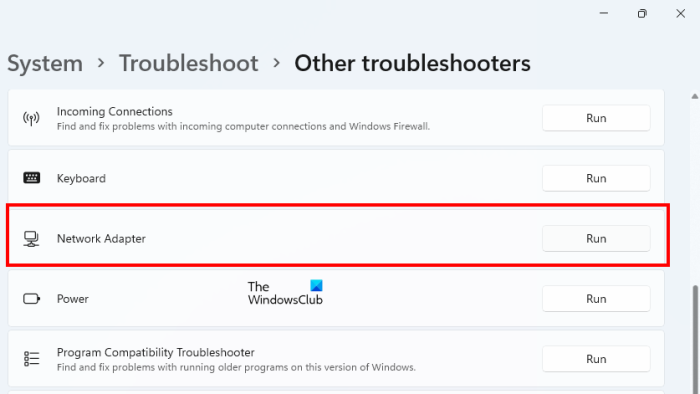
The steps to run the Network Adapter Troubleshooter are as follows:
- Open Windows 11/10 Settings.
- Go to “System > Troubleshoot > Other troubleshooters.” In Windows 10, you will find Additional troubleshooters link in place of Other troubleshooters.
- Locate Network Adapter and click Run.
Now, check if the issue persists.
2] Roll Back your Network driver
If the Network Adapter is showing in the Device Manager but your system cannot connect to the internet, you can try rolling back your Network driver. This trick fixed the issue of some users. You can roll back your device drivers from the Device Manager.
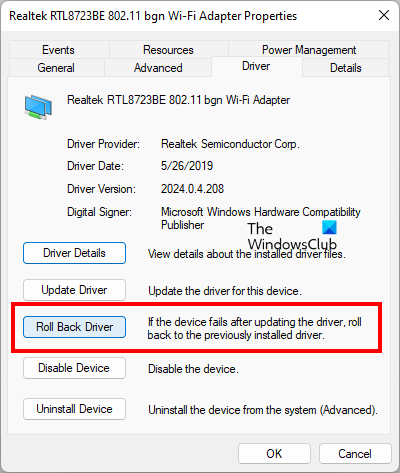
The steps to roll back the Network driver are as follows:
- Open the Device Manager.
- Expand the Network adapters node.
- Right-click on your Network driver and select Properties.
- Select the Driver tab.
- Click on the Roll Back Driver button.
After rolling back your Network driver, check if the issue persists.
3] Install the Network driver manually
Some users have found the Network driver missing from the Device Manager. In this case, manually installing the Network driver will fix the issue. You have to download the driver from your computer manufacturer’s official website and then install it manually.
Because your computer is not connected to the internet, you have to use another computer to download the driver. Now, move the downloaded driver to your computer using a Pen Drive and install it on your system.
If the Device Manager is already showing your Network driver but your system is showing the “Windows did not detect any networking hardware” error message, follow the steps written below:
- Open the Device Manager.
- Expand the Network adapters node.
- Right-click on your Network driver and select Uninstall device.
- Now, download the latest version of your network driver from your computer manufacturer’s official website by using the method described above and install it on your system.
4] Uninstall the recent Windows Update
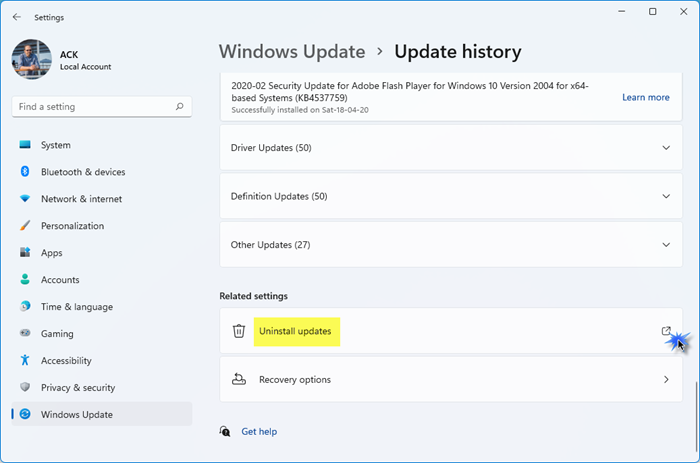
Some users have found the Network driver missing from the Device Manager after updating their system. In this case, uninstalling the recent Windows Update will fix the problem. You can uninstall Windows Updates from Windows 11/10 Settings.
Read: Wireless Network not detected when using VPN
5] Perform a System Restore
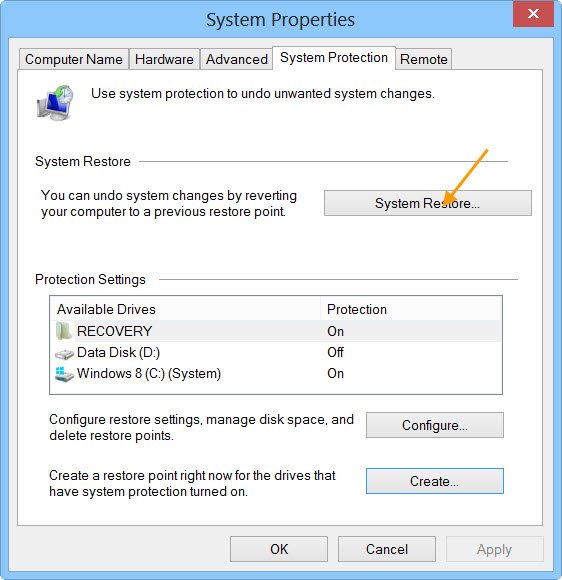
System Restore is a tool developed by Microsoft Corporation that helps users protect and repair their systems. When you run this tool, it restores your system by taking it back to the previous working state. When you turn on System Restore, it takes the snapshots of Windows Registry and system files and stores them on your disk. This is called a System Restore Point. Windows uses this System Restore Point to restore your system. Restore your system by using the System Restore tool. It should fix the issue.
6] Disable the Selective Suspend property for Marvell Avaster
Some users have found Marvell Avaster Wireless-AC Network Controller the cause of this issue. Open the Device Manager and check if this wireless adapter is installed on your system. If yes, disable its Selective Suspend property. The following steps will guide you on this:
- Open the Device Manager.
- Expand the Network adapters node.
- Right-click on the Marvell Avaster Wireless-AC Network Controller and select Properties.
- If the Advanced tab is available, click on it and then disable Selective Suspend.
Now, check if the issue persists.
7] Uninstall the problematic VPN
A lot of users confirmed that the issue was occurring due to a third-party VPN installed on their systems. According to them, the issue occurred because they did not uninstall the third-party VPN before upgrading their systems from an older Windows version to a newer one. The names of some third-party VPN software reported by the users are:
- Cisco VPN and Cisco AnyConnect software
- SonicWall VPN
- WiTopia Client
If you have installed any of the above-mentioned VPN software, roll back to the previous version of Windows, then uninstall the VPN software. For example, if you have upgraded your system from Windows 8 to Windows 11, roll back to Windows 8 and then uninstall the third-party VPN software. After uninstalling the VPN software, upgrade your system again. After upgrading your system, you can install the third-party VPN again. This will fix your problem.
The issue might also be occurring due to the DNI_DNE component. You can check if this component is installed on your system by running the following command in the elevated Command Prompt.
netcfg -s n
After opening the administrator Command prompt, copy and paste the above command into it. Hit Enter and see its output. If the output shows DNI_DNE, you have to delete the DNI_DNE component from your system. To do so, open the Command Prompt as an administrator and copy and paste the following commands into it one by one. Press Enter after pasting each command.
The following commands will delete a key from Windows Registry. Therefore, it will be better if you create a System Restore Point and back up your Registry before proceeding.
reg delete HKCR\CLSID\{988248f3-a1ad-49bf-9170-676cbbc36ba3} /va /f
netcfg -v -u dni_dne
If you get an error after executing the first command, execute it again without va. This should work. The command, in this case, is as follows:
reg delete HKCR\CLSID\{988248f3-a1ad-49bf-9170-676cbbc36ba3} /f
netcfg -v -u dni_dne
If the above command fails to delete the Registry key, the error will not get fixed. In this case, you have to delete the Registry key manually from your Registry Editor. Make sure you have created a System Restore Point and backed up your registry.
Follow the steps written below;
Press the Win + R keys to launch the Run command box. Type regedit and click OK. Click Yes in the UAC prompt. This command will open the Registry Editor.
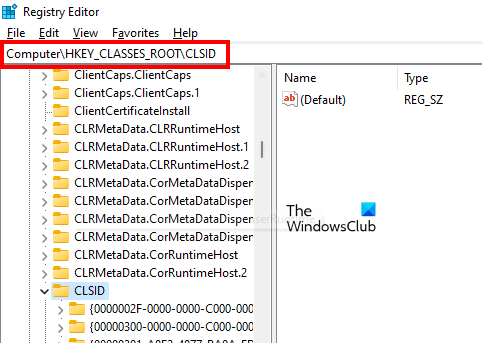
Copy the following path and paste it into the address bar of the Registry Editor. After that, press Enter.
HKEY_CLASSES_ROOT\CLSID
Now, expand the CLSID key and locate the {988248f3-a1ad-49bf-9170-676cbbc36ba3} subkey under the CLSID key. Once you find it, right-click on it and select Delete.
Close the Registry Editor and restart your computer. After restarting your device, the problem should get fixed.
What happens if Windows does not detect a Network adapter?
If Windows doesn’t detect the Network adapter, you will not be able to connect your computer to the internet. A driver acts as a connecting link between hardware and the operating system. If a driver malfunctions or if Windows is not able to detect the driver, the respective device will not work.
Read: Internet not working after Windows Update in Windows 11/10.
How do I fix the Network adapter not found?
Open the Device Manager and expand the Network adapters node. See if there is a warning exclamation sign on your Network adapter. If yes, uninstall it and restart your computer. Windows will automatically detect the hardware changes on the restart and install the missing driver. Or you can also download the latest version of your Network adapter from your computer manufacturer’s official website and install it manually. If you are not connected to the internet, you can use your friend’s computer to download the driver.
I hope this helps.
Read next: How to fix Network & Internet connection problems in Windows 11/10.
Leave a Reply